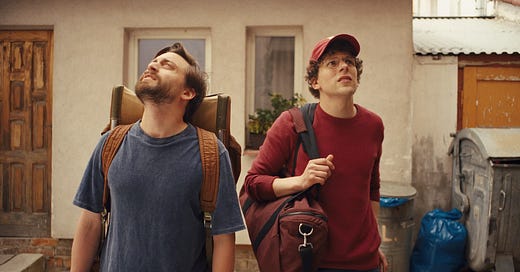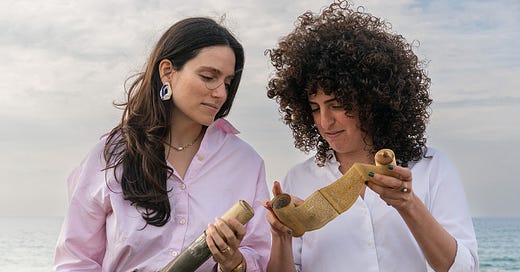
The Free Press

Holocaust and tourism are a strange pairing: a road trip to hell. At Auschwitz, I saw a man check his Tinder, and I watched a tour descend into a gas chamber with obvious excitement. But as survivors die—we’re coming up, this month, on the 80th anniversary of the liberation of Auschwitz—and as antisemitic theories doubting the Holocaust spread again, these places survive as the last connection to the truth.
Why we tour these sites of human depravity is a subject I’ve written about before, and it’s the theme of the new movie A Real Pain. Written and directed by Jesse Eisenberg, the film is about Jewish American cousins Benji, played by Kieran Culkin, and David, played by Eisenberg, visiting Poland on a guided trip alongside a lonely divorcée, a married couple, and a Rwandan genocide survivor who has converted to Judaism. Benji and David see the sites and visit their late grandmother’s childhood home. She escaped the Holocaust, and bequeathed them the money for the trip because she wanted them to understand themselves better. It’s a tender, touching film about how trauma cascades down generations, and it’s interesting to see what is, essentially, a Holocaust film set many years after the fact.
Benji is warm and wild, while David is conventional and shy. Both are flailing. In Lublin’s Old Jewish Cemetery, Benji scolds the tour guide for using too many facts when discussing the Jews who died there. “These are real people,” he rants. “This is making the whole thing feel really cold.”
But that’s Poland. When I went in 2021, and again in 2023, I found there was an ambivalence toward Jews and, as Benji also notices in the film, an awful emotional deadness.
I visited Kraków, specifically Kazimierz, the old Jewish quarter, and found a sort of haunted Jewish Disneyland. There were golf buggies that have ghetto written on them, and tourists who thought a trip to a once–Jewish quarter might be fun. Restaurants played Jewish klezmer music and served Jewish food like chicken soup with matzo balls but not often to Jews: There aren’t enough of them. There were 3.3 million Jews in Poland in 1939, and there are estimated to be 10,000 now. The Poles try to make up for it, in their way. A “Jewish” restaurant I went into was filled with paintings of Jews counting money, and there were tiny wooden Jews holding coins for sale in the market. These toys are called “Lucky Jews.”
As in A Real Pain, I took a tour bus to a death camp.
“I’m not disappointed,” a woman told me at Auschwitz, sitting under a tree. “It is horrifying.” I met a museum director who told me about an episode where non-Jewish Poles insulted Israelis who had booked tickets to a Shabbat service in Kraków. The Poles wanted to attend the Shabbat service too and were furious that there was no room for them. “You’re lying!” they told the Israelis. “You’re lying! You care only about yourselves, you Jews!” The most stupefying comment came in the form of a TripAdvisor review I stumbled upon: "Seriously I have been 1 week in Poland and rarely saw some smiles. Customer care is [a] disgrace. . . when they talk to you they show you they are not happy to help you. Never again."
In the movie, two minor characters are types I recognize: the non-Jewish tour guide who is “completely obsessed” by the Holocaust, and the Polish man who chides Benji and David for leaving rocks as a memorial outside their grandmother’s childhood home. “Sweet,” he has his grandson tell them in English, after they explain what they are doing. Now move the rocks, he insists. They are a tripping hazard. It’s a beautiful scene.
On my own tour, one of my two guides at Auschwitz wore a salmon-colored cocktail dress. The other informed us that “the Sonderkommandos had quite a luxe life.” Sonderkommandos were Jews kept temporarily alive to dispose of Jewish bodies. In the town of Oświęcim, where Auschwitz is located, I met a young man who grew up there. He said that at school, if you wanted to call someone mean, you called them “a fucking Jew.” The death camp was “like the Voldemort name in Harry Potter.” You didn’t say its name.
I suspect the key to the problem of Holocaust tourism is symbolized by an artifact in the Auschwitz-Birkenau State Museum. It is a vast pile of hair, taken from thousands of Jewish people. It has bound together, and is now all the same color, like a thing. I found little at Auschwitz about individual victims; who they were, or what we lost by losing them. I thought I would find, in some form, a memorial to the civilization that ended here: some tenderness, or regret. Instead I was rushed through the exhibits while the guide, clearly bored, spoke in a monotone, like the one in the movie who, rebuked by Benji for his “factoids,” offers spare, respectful commentary. He says almost nothing.
Today, Israeli prime minister Benjamin Netanyahu risks arrest if he attends the 80th anniversary of the liberation this month, due to the International Criminal Court’s warrant for his arrest. That’s as darkly funny as anything in A Real Pain, and it begs the question—have 80 years of Holocaust remembrance fulfilled their raison d’être?
At the end of the movie, the cousins travel back to America and say goodbye at the airport terminal. Except Benji won’t leave the terminal. He settles into a seat with a look of horror on his face, and we leave him there. After my trip to hell, I have to say: I felt the same.
Tanya Gold is an award-winning freelance journalist. She lives in the UK. Read her last piece for The Free Press, on The Bear.
Donald Trump, just sworn in as the 47th president, was reelected to be a wrecking ball to the Beltway elites. And while this populist moment feels unprecedented, host of our new show Breaking History Eli Lake says it’s not—the rebuke of the ruling class is encoded in our nation’s DNA. Listen to the first episode below or wherever you get your podcasts.













